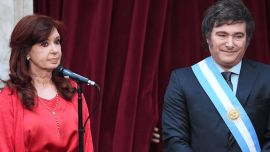President Mauricio Macri cleared his schedule and jumped on a plane to the Patagonian town of San Martín de los Andes this week to rest after what can only be seen as a successful G20 Leaders Summit in Buenos Aires. Not only did Argentina take advantage of its position as host to schedule 17 bilaterals that resulted in over 50 agreements — including US$6.5 billion in energy and infrastructure investments from China — Macri also counted on the full support of Donald Trump, who begrudgingly met with Xi Jinping to announce a hazy truce to their global trade war – enough to help his friend Mauricio close the G20 weekend on an even more positive note.
As the president rests with First Lady Juliana Awada, surrounded by the peaceful Andes Mountains, playing golf and awaiting the long-delayed final of the Copa Libertadores between River and Boca, the country’s situation remains fluid as ever: the economy is in stagflation mode, with the shadow of Cristina Fernández de Kirchner looming as present as ever, and an internal battle in the ruling Cambiemos (Let’s Change) coalition that pits emboldened Security Minister Patricia Bullrich against Civic Coalition leader Elisa “Lilita” Carrió. With 2019 just around the corner, it seems like this frenetic pace of events will only accelerate as we enter campaign season.
The historic Buenos Aires G20 summit left a good taste in the government’s mouth, but it is not too much more than that when looking at the domestic front. Macri and Awada were impecable hosts, with the president’s tears at the Teatro Colón gala demonstrating both relief and the intense pressure he has been under. A genuine Macri, he once again proved that he is at his best on the international stage. Trump, the protagonist, even told him he was here for him, and obliged in holding a much-anticipated dinner with the Chinese premier, in which they agreed to hold an open dialogue before increasing tariffs and further escalating a global trade war. Markets rallied, Macri sighed in relief.
Security, which was a major concern due to violent incidents that forced the cancellation of the Copa Libertadores Final on the eve of the summit, didn’t disappoint. A massive rally on the opening day passed off without violence, while every G20 event ran smoothly, giving global leaders an impression of normalcy that’s quite uncommon to the country these days. A big part of that credit goes to the always controversial Security Minister, Patricia Bullrich, who days before the summit suggested people should carry weapons if they so pleased, and then asked Buenos Aires City residents to “leave town” during the G20 weekend. Bullrich’s somewhat tainted record as security minister appears to have been washed clean by the summit, as she has quickly become a potential candidate for vice-president in next year’s elections.
While it remains too early for any profound takeaways, the electoral strategy team composed by Cabinet Chief Marcos Peña and star Ecuadorean advisor Jaime Durán Barba have been measuring the impact of the summit on the electorate. Early polls indicate the erosion in the administration’s approval ratings reversed in the last week of November, while the perception that the economic situation is improving rose, as did political trust in the Cambiemos (Let’s Change) coalition, according to Management & Fit consultancy.
With Peña and Durán Barba watching on with a close eye, the Security Ministry this week announced a revision to federal security forces’ rules of engagement, allowing them to use firearms unannounced and before being attacked. While human rights organisations cried foul, the new security protocol garnered the support of 60 percent of those polled by the aforementioned political consultancy firm. The move is being interpreted as an electoral strategy ahead of 2019 that follows in the footsteps of Brazilian President-elect Jair Bolsonaro, who won the support of the rich and the poor with his “iron fist” approach to security. It’s also a continuation of the so-called ‘Chocobar Doctrine,’ in reference to the police officer who shot and killed a thief a year ago in La Boca neighbourhood, who was praised by Macri and Bullrich but condemned by human rights groups.
It also exposes the grieta or internal divisions that are a defining characteristic of Cambiemos. Immediately, Carrió — one of the “founders” of the coalition — tweeted against the measure, calling it a descent into “fascism” and a clear violation of human rights. Carrió is a key player for Macri, guaranteeing the support of urban middle classes, disillusioned with the rampant corruption that has marked Argentina for decades. She is Macri’s antidote to those accusing him of governing for his former colleagues (businessmen) and friends, at the expense of the people. The government’s political wunderkind, Buenos Aires Province Governor María Eugenia Vidal, picked up the glove. “I don’t agree with Lilita Carrió,” she said Thursday night in a TV interview, “Yet, I still celebrate, even if it frightens some, the internal democracy of the president’s political space,” Vidal added strategically.
Stoically, Vidal has been one of Macri’s most important supporters. Buenos Aires Province is the most populous region in Argentina, making it the decisive electoral battleground, and crucially, it has also been the central bastion of Kirchnerite support. Not only did Vidal beat out Cristina’s candidate in 2015, she also led the 2017 midterm campaign where a little-known candidate, Esteban Bullrich, essentially beat the former president in her home turf. Vidal has also sacrificed her province’s finances so that the national state managed to pass a budget through Congress which counted with the support of opposition governors in exchange for fresh funds.
Macri knows his team of seasoned veterans has perfected their winning strategy since he was a Buenos Aires City representative. Peña and Durán Barba have won every election since 2007 – when Macri was elected mayor – by differentiating themselves from the Peronists, and the Kirchners in particular. Until the G20 summit, the polls indicated Macri’s disastrous economy had helped CFK’s support grow, making it clear that the president and his antagonist are the only two real players in the political field ahead of 2019. As he clears his mind on the green, his team is looking for the best running mate to replace Vice-President Gabriela Michetti. Bullrich has gained political capital, but is also quite divisive. It’s known that Durán Barba has recommended a female running-mate. Bullrich has her chance, but she will need the support of Vidal and, of course, to beat out Social Development Minister Carolina Stanley, the other front-runner. Decision time nears.



















Comments